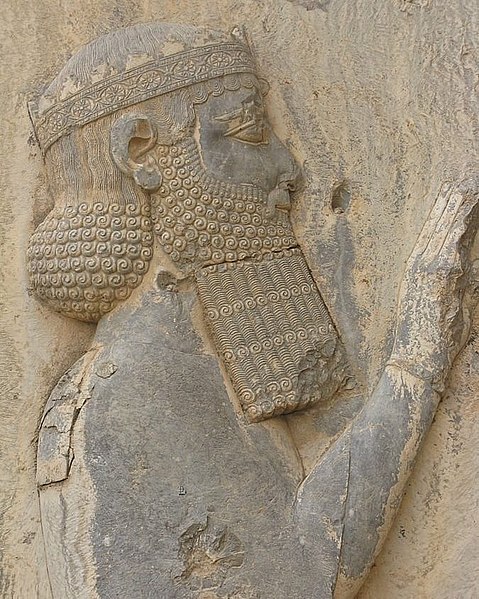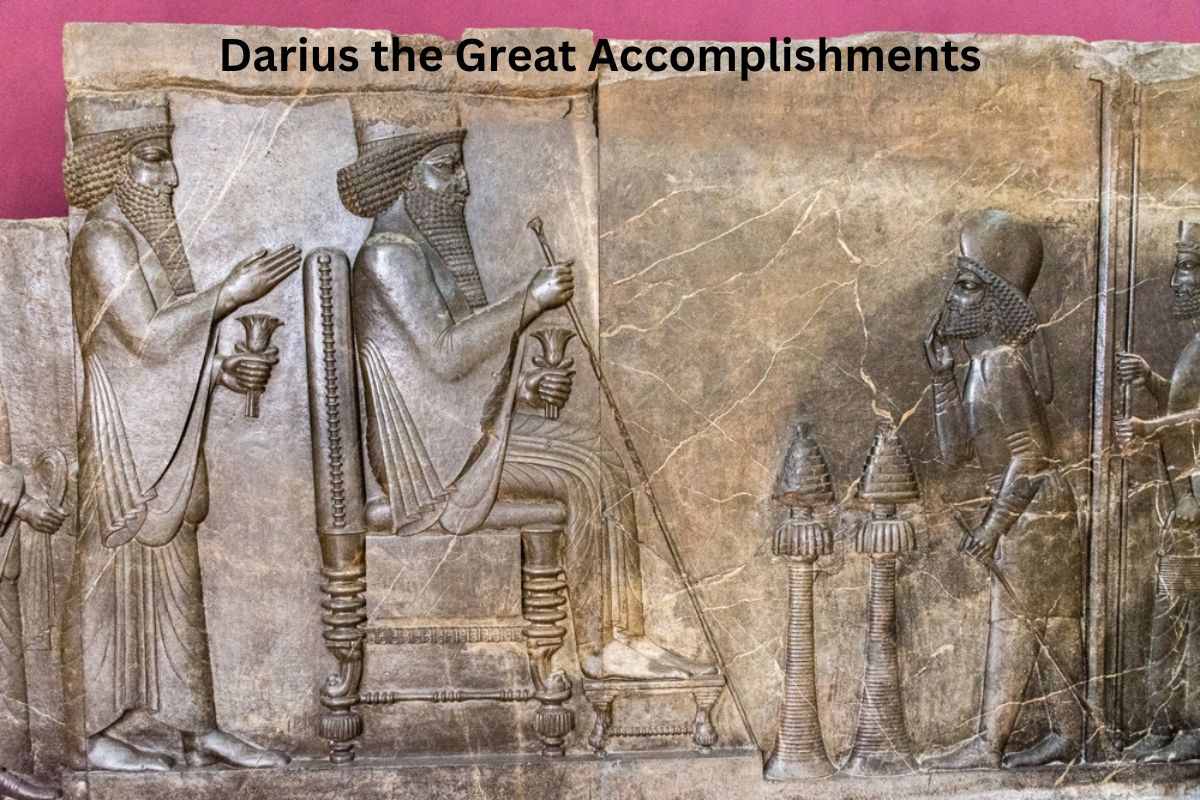Darius the Great, also known as Darius I, was a Persian king who reigned from 522 BCE to 486 BCE. He was a significant ruler of the Achaemenid Empire, one of the most extensive and powerful empires of the ancient world.
Darius ascended to power following a period of unrest and revolts and is known for his achievements in consolidating and expanding the empire.
His accomplishments include the construction of the grand city of Persepolis, the standardization of coinage, the establishment of an efficient administrative system of satrapies, the construction of the Royal Road, and the introduction of a legal code.
Darius also led military campaigns to expand the empire’s territories, promoted cultural diversity, initiated an ambitious canal project in the Persian Gulf, and upheld religious tolerance within his vast and diverse realm.
His reign left a lasting legacy in Persian history and the broader context of the ancient world.
Accomplishments of Darius the Great
1. Established the Achaemenid Empire
Darius ascended to the Persian throne in 522 BCE after a period of political turmoil and revolts. He was instrumental in solidifying and expanding the Achaemenid Empire, which was founded by his predecessor Cyrus the Great.
Darius managed to quell internal uprisings and consolidate power within the empire. His reign marked the peak of Achaemenid influence and territory, with the empire spanning from Egypt in the west to the Indus Valley in the east, encompassing a vast and diverse array of cultures and regions.

2. Built the grand capital city of Persepolis
Darius embarked on an ambitious architectural project by ordering the construction of Persepolis. This magnificent city, located in modern-day Iran, served as the ceremonial capital of the Achaemenid Empire.
The construction of Persepolis began around 518 BCE and continued for several decades. It featured impressive palaces, audience halls, and monuments adorned with intricate artwork and inscriptions.
The city’s architectural splendor showcased the wealth and power of the Persian Empire and served as a symbol of Persian culture and authority.
3. Implemented administrative reforms and satrapies
Darius introduced a systematic administrative structure that divided the vast Achaemenid Empire into provinces called satrapies. Each satrapy was governed by a satrap, who acted as both a regional governor and a tax collector.
This decentralized administrative system allowed for efficient governance and tax collection while maintaining a degree of autonomy within the satrapies. Darius also established royal inspectors, known as “the king’s eyes and ears,” to monitor the satraps and ensure their loyalty to the central government.
This administrative reform contributed to the stability and longevity of the Achaemenid Empire.
4. Standardized coinage
Darius introduced a standardized coinage system, which played a crucial role in facilitating trade and economic stability within the Achaemenid Empire.
The most famous of these coins were the gold daric and the silver siglos. These coins had consistent weights and were stamped with images and inscriptions that identified them as Persian currency.
This standardization made it easier for merchants and traders across the empire to conduct business and exchange goods, as they could rely on the value and authenticity of these coins.
5. Constructed the Royal Road
Darius is often credited with the construction of the Royal Road, an extensive network of roads and highways that connected the major cities and regions of the Achaemenid Empire.
The road spanned approximately 1,500 miles (2,414 kilometers) from the Persian capital of Susa to Sardis in Anatolia (modern-day Turkey). Along the way, it had numerous rest stations known as “caravanserais.”
The Royal Road greatly improved communication, trade, and the movement of troops within the empire. Messengers on horseback, known as “royal couriers,” could travel the length of the road in a matter of days, ensuring efficient communication across the vast empire.
6. Introduced a legal code (Darius’ Code)
Darius implemented a comprehensive legal code that aimed to establish a fair and just legal system throughout the Achaemenid Empire.
Although the exact details of this legal code are not fully known, it is believed to have emphasized principles of justice, equality, and the protection of individual rights.
Darius’ legal reforms contributed to the development of a more orderly and equitable society within the empire.
The legal code helped resolve disputes, enforce contracts, and maintain social order, ensuring that the rule of law prevailed across the vast and diverse territories of the Achaemenid Empire.
7. Led military campaigns to expand the empire
Darius embarked on several military campaigns during his reign to expand and consolidate the Achaemenid Empire’s territories.
Notable among these campaigns was the suppression of revolts in various regions, including the famous Ionian Revolt (499-493 BCE) in Anatolia, which brought the Greek city-states of Asia Minor under Persian control.
Darius also conducted campaigns to secure and extend Persian dominance in Egypt and the Indus Valley, further enhancing the empire’s reach and resources.
8. Promoted cultural exchange and diversity
Darius recognized the importance of cultural diversity within his vast empire and actively promoted cultural exchange. He encouraged the use of various languages, including Aramaic, Elamite, and Old Persian, in administrative and official inscriptions.
This approach allowed for the efficient administration of the diverse empire while respecting local customs and traditions. Darius’ reign is often seen as a period of relative cultural tolerance, fostering an environment where different peoples and cultures could coexist and influence one another.
9. Initiated the Persian Gulf canal project
Darius initiated a grand engineering project aimed at connecting the Nile River to the Red Sea through a canal. This ambitious canal, known as the “Canal of the Pharaohs” or the “Fossa Regia,” was intended to facilitate maritime trade between the Mediterranean and the Indian Ocean.
Although the canal was never completed during Darius’ reign, his efforts demonstrated a forward-thinking approach to infrastructure development and trade expansion.
10. Supported religious tolerance within the empire
Darius is known for his policy of religious tolerance. While he promoted Zoroastrianism as the state religion, he allowed freedom of religion for his subjects.
Darius respected the beliefs and practices of various religious groups within the empire, including Jews who were allowed to rebuild their temple in Jerusalem after the Babylonian Captivity.
This religious tolerance contributed to social cohesion and stability within the diverse Achaemenid Empire and helped maintain the loyalty of different religious communities.
